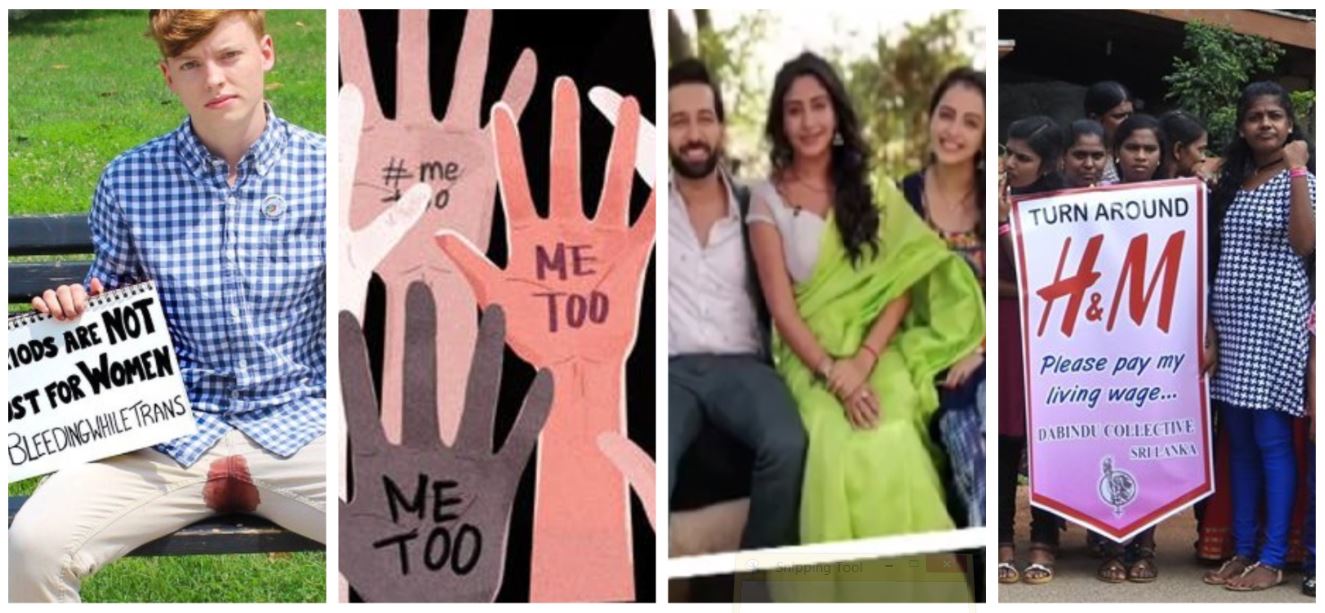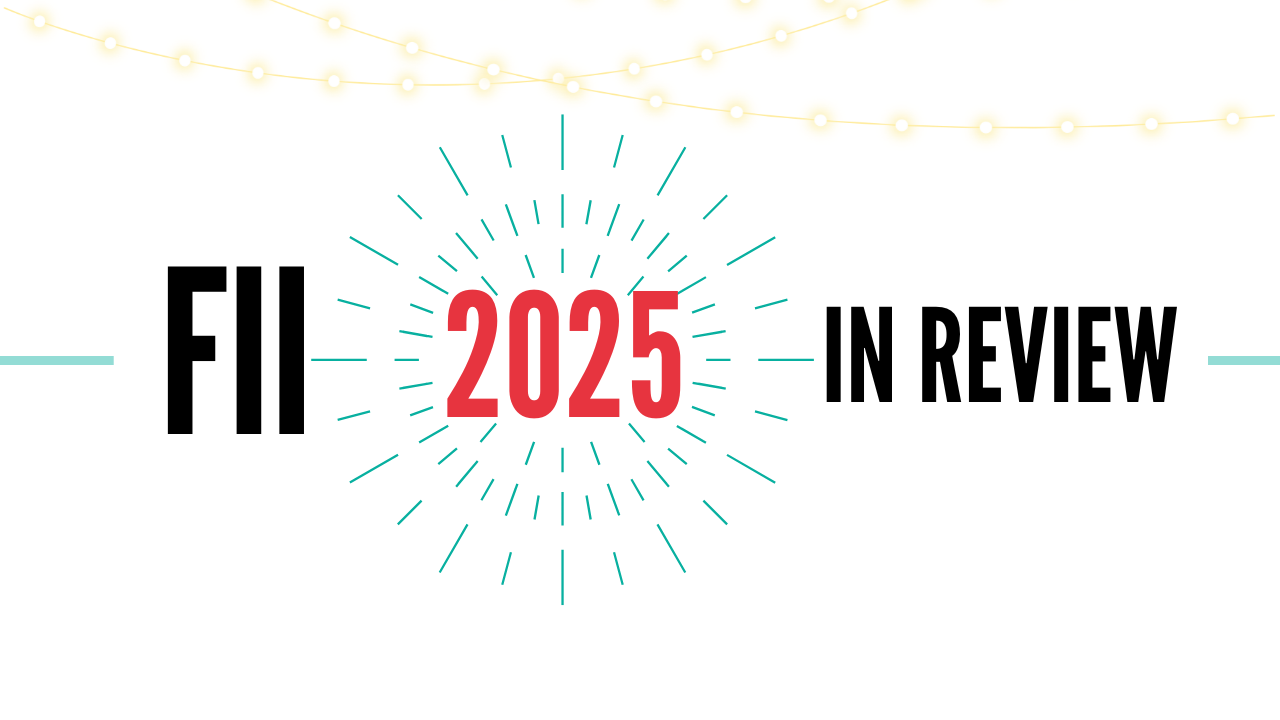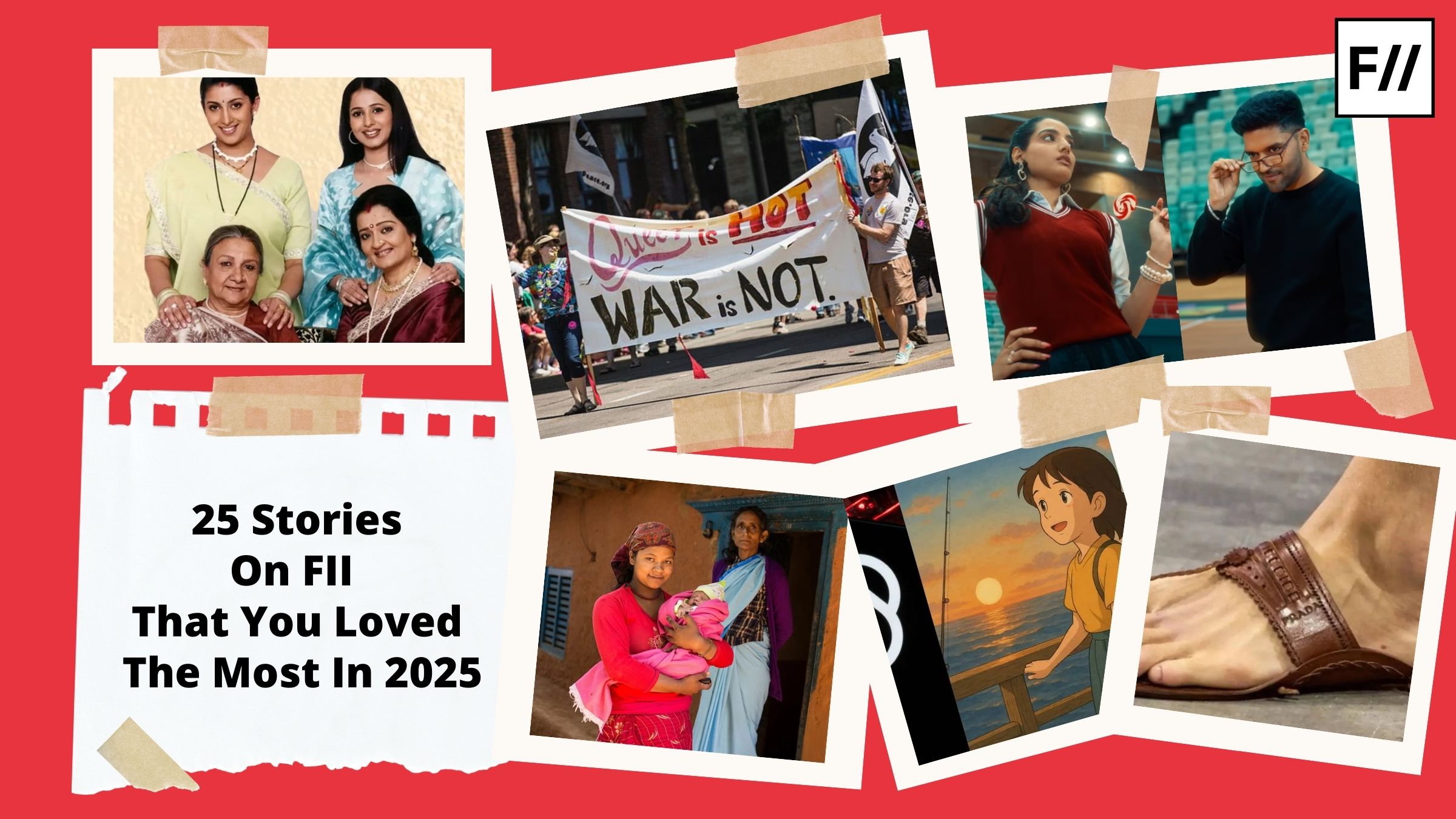Check out the top 18 articles that you loved reading this year!
1. These Are The 15 Women Who Helped Draft The Indian Constitution by Yoshita Srivastava
The Constitution of India was adopted by the elected Constituent Assembly on 26 November 1949 and came into effect on 26 January 1950. The total membership of the Constituent Assembly was 389. While we all remember Dr. B R Ambedkar as the Father of the Constitution and other pioneering male members who helped draft the Indian Constitution, the contribution of the fifteen female members of the Constituent Assembly is easily forgotten. On this Republic Day, let’s take a look at the powerful women who helped draft our Constitution.
2. Why We Need To Rethink Our ‘Criticism’ Of BTS And K-Pop by Pallavi Varma
Viewers all over the world were glued to their televisions and laptops on the late night/early morning of Sunday (20/21 May) for the Billboard Music Awards 2018 (BBMAs), an annual phenomenon that has been showcasing enchanting live performances, celebrating diverse genres of music and awarding acclaimed artists since the 90s. Although a highly anticipated event every year, since 2017 it has kicked up excitement for fans of the Korean boy group BTS (Bangtan Sonyeondan/Bulletproof Boy Scouts).
3. What Exactly Is Happening With Ishqbaaaz And Why Is Star India Still Silent About It? by Amrita and Eman
Ishqbaaaz has paved the way for progressive storytelling and innovation. In its two-and-half year tenure, the creators never once resorted to tried and test tropes such as memory losses, reincarnations and generation leap; instead they chose to subvert them. The lead pair, Shivaay and Annika, played by Nakuul Mehta and Surbhi Chandna respectively, have been the faces of Star Plus’s ethos, which focuses on female empowerment and gender equality, and they have been present for every one of Star Plus‘s major campaigns, including Women’s Day and most recently for HeForShe.
Around mid-November, it was revealed that Ishqbaaaz was due to take a generation leap sans Surbhi Chandna, Shrenu Parikh, Mansi Srivastava and two of the original male leads, Kunal Jaisingh and Leenesh Mattoo. In the initial interviews and online comments by Gul Khan (the head of 4 Lions Films), the it was heavily implied that season two is in the pipeline because of the lead actress’s unwillingness to play a mother.
4. 5 Feminist Economists Who Change The Way We See The World by Ashraya Maria
Economics generally assumes that all individuals are equal, in terms of the choices that they can make, and ascribes rationality to individual utility maximisation. This assumption fails to take into account the differential social positions of individuals, which may constrain their choices or give them power over others. These are but a few of the dilemmas in mainstream/textbook economic thought. Sexism in economics does not end here. Even at the professional level, economics can be extremely sexist, by devaluing the contributions of women.
Feminist economics is committed to addressing these dilemmas by working through gender issues. It entails a reworking of the principles of economics, and the dismantling of various assumptions. Some of the methodological legacies of feminist economics includes the disaggregation of macroeconomic data by sex, the recognition and incorporation of gender roles (including productive and reproductive activities) resulting in gender-aware policy and planning and gender budgeting, and the formulation of indices such as the Gender Empowerment Measure (GEM), and the Gender-related Development Index (GDI). Here are five feminist economists and their contributions.
5. Why Women Workers Are Protesting Against H&M by Hamsadhwani Alagarsamy
Dabindu Collective is an organisation based in Sri Lanka which works closely with women workers in Free Trade Zones and other industrial areas. On November 27th, they organised a protest against the multinational clothing-retail company H&M, which has consistently failed to provide its workers with living wages. The primary participants in the demonstration were workers of the Hidramani Factory, Vavuniya, Sri Lanka.
It was a peaceful protest and demanded only that workers be given the living wages they are legally entitled to. Yet, according to sources at Dabindu Collective, the workers who had taken part in the protests were interrogated and threatened by the factory management. With employment opportunities being scarce, this served to be an efficient means to scare the workers into silence.
6. The Kinky Way Forward: How BDSM Helped Liberate My Sexuality by Anonymous
Endless nights were spent in research: is it normal that I feel this way? What is BDSM? Why do I feel this way? How to be ‘submissive’? What is control? I was met with a slew of content, often unhelpful. The first of this was, of course, pornography that was heavily directed towards the male gaze. And therein began my conflict – the videos seemed to propagate non-consensual sex, rape, torture, abuse, slavery, confinement, humiliation, suppression, and more often than not, pain. I was not only immediately disheartened, but disillusioned with myself.
Where are my principles if I am watching this content and contributing to the propagation of these injustices? As a person who has been sexually abused, how can I like this? I was torn between being a ‘good feminist’, standing up for the rights of women, and my sexuality.
7. Facing Abuse From Within The Disability Sector: My #MeToo Moment by Shampa Sengupta
I knew I had to write this some time or the other but kept on postponing it because of self-blaming and the shame that I felt to confess about the sexual harassment I faced. I am known for my work on violence against women with disabilities, yet I myself had been sexually harassed and could not do anything about it.
Is it easy to confess this and tell the world the whole story? No, it is extremely difficult to admit something like this. But the fact remains that I, who had fought for changing laws on sexual violence of my country, who stood for so many survivors of rape and molestation, who gave lectures at different places on sexual violence, who organised so many Dharnas against sexual violence, was harassed and could not take any action against it. There are various reasons why I never talked about it. Internalised self-blaming was only one of them. Let me share the details here. Here goes my #MeToo story.
8. Dear Tamil Cinema, Let Brown Women Play The Role Of Brown Women by Hamsadhwani Alagarsamy
We have Punjabi women wearing dhaavanis (half-saree) and calling themselves Madurakkari (Madurai woman). We have a Sindhi woman playing the character of a pattu-pavadai-wearing (traditional South Indian attire made of silk) Tamil woman called Koperundevi, while another Sindhi woman calls herself Yazhini and plays the daughter of a Tamil teacher when the extent of her own Tamil vocabulary is limited to vanakkam (hello). The only representation brown-skinned Tamil woman get is as the best friend of the female lead, and the dark-skinned women are taught that they are jokes (looking at you, Shankar).
9. It Took Me A While To Realise That I Was A Rape Survivor by Anonymous
Rape is a heavy term. Even as a small child, I knew it was a woman’s worst nightmare. Remember the movie Pardes, where the girl’s fiancee rapes her? I used to change channels at the sight of it. I still don’t believe that I put up with something like this.
Only when I felt that enough is enough, that I finally spoke to a professional about it, who was shocked to hear about it and ended up blaming me indirectly. I was thought of as this naive woman, with an inability to read a man’s advances and being defenceless to the hilt.
A week after, I finally mustered enough courage to speak to my family about my abuse. At first, I didn’t blurt out the entire truth, only suggested that he tried to hug me tight, so I pushed him away, which was far from the truth. In a way, I tried to downplay the story of my own rape.
10. Nusrat Fateh Ali Khan: His Qawwali And Everyday Sexism posted by Ismat Ara
On days when my mother wouldn’t make too much of my insincerity towards religion, I’ve often told my mother in good humour that if I could bow down to anyone except for god it would be the maestro Nusrat Fateh Ali Khan Sahab, possessor of the most beautiful voice in the world, that has the power to hook me to 20 minutes long Qawwalis early in the morning. Even when I’m out with my friends, I would often fight with them to play these “excruciatingly long” (in their words) Ghazals, Nazms and Qawwalis instead of some rock music or the deafening EDM.
Such is my dedication to this pristine form of art!
One such morning while listening on loop to, ‘Kali Kali Zulfon ke phande na daalo’ which literally translates to ‘do not lure me with your lustrous (black is used figuratively) hair…’, I realized that I was missing something.
11. 6 Things Single Women Still Can’t Do And It’s 2018 by Ayushmita Samal
As women, we have continuously been told that we need to ‘fit in’ or ‘blend into’ the spectrum of the societal expectations and norms. The life of a woman is measured by the number of expectations she has stood up to. Regardless of the success she might have tasted in her professional work, she is subject to being judged and labelled by some of the simple choices that she makes. Remaining unmarried is one such choice. However, in our country, there is a lot that a single woman has to go through, by the simple virtue of being unmarried.
12. Some Men Menstruate Too. Can We Talk About It Now? by
Kabir Trivedi
Most transgender men I know are not comfortable talking about their periods. It’s often a source of dysphoria and discomfort, but it is a health and hygiene issue that people need to know more about. Not all women have periods, and not all people having periods are women.
Recently, there has been a shift in menstrual health activism, which has sought to include all menstruating individuals. Thinx, a brand of period underwear, markets itself as being a product “for people with periods”. Trans man Kenny Jones has become the face of Pink Parcel’s campaign for normalising menstruation, called “I’m ON”. However, these developments are only to be seen in the West, and menstrual health activism in India usually excludes all non-cis women.
13. Here’s How Toxic Monogamy Culture Is Ruining Our Relationships by Damini Mehta
Toxic monogamy culture – as defined by the idea of the prevalent love that is monogamous in nature – is a relatively new concept that has percolated throughout society, and can be seen in elements of relationships within the community. Toxic monogamy displays signs of codependency which manifests in ways that have invariably toxic outcomes. However, it’s very hard to identify as it is romanticised and sent out as a narrative of “true limitless love” instead of being seen as the problematic behaviour that it is. It even goes on to solidify gender roles within the relationship; further concretising that socially acceptable relationships are heteronormative in nature and therefore further marginalising relationships that are anything but heteronormative.
14. The New MCI Guidelines Lead To Seat Cancellation Of Disabled Medical Students by Tanya Jha
Several medical students with disability had to face admission denials as well as cancellation because of the formulation of ‘Guidelines for person with specific disability’ issued by the MCI (Medical Council of India). The cancellation trail violates the Rights of Persons with Disability Act, 2016 and the United Nations Convention on Disability Rights, which guarantees non-discriminatory opportunities for people with disability in educational institutions.
In response to it, a group of 75 doctors with disability have written a letter to the Union Health Ministry rejecting the unfair guidelines while appealing for a reformulation. Addressed to Union Health Minister, J P Nadda, the letter highlights the multiple litigation filed by students; lack of infrastructural support and disabled-friendly legislation operating in other countries.
15. Why Understanding Brahminical Patriarchy Is Of Utmost Importance by Sanjana Pegu
One needn’t get into the details of the sheer amount of easily-verifiable fake data (Brahmins are the poorest in the country), claims of reverse casteism and victimhood (Brahmins are suddenly the oppressed lot since they are only 5 per cent of the country’s population and yet, mysteriously control much of Indian capital along with Baniyas), conspiracy theories that Dalit activists are funded by the Church (an old favourite), comparisons with anti-semitism (historians were perturbed to discover their ignorance of that time when Brahmins were exterminated in the millions), and unbridled revisions of history (Dalits were not “bound”, free to move but apparently not free to seek a different kind of life, job or status).
A neologism, ‘Hinduphobia’, has also been coined for savarna warriors to use as a strategic weapon in their online wars, giving credence to the fact that they see Hindus primarily as caste Hindus because until this time, the vitriol and virulent abuses faced by Dalits and Adivasis were never considered as an attack against Hinduism. The similarities of these arguments with the ones peddled by men’s rights activists are quite eerie.
16. Adivasi Community Remains Invisible And Unheard In The Hindi Movie Industry by Sameer Bhagat
In India, the first feature film was made in 1913. Now this Hindi film making business has gone for more than a century with thousands of films being produced each year in India. Despite that, we can simply count with the fingers the number of movies that had Adivasi stories and characters.
I hope that you all remember the movie Chak De! India that came out almost a decade ago in August 2007. It is an iconic sports movie based on the fictionalised triumphs of the Indian Women’s Hockey team at the world stage. This movie had four Adivasi players, namely, Mary Ralte, Molly Zimik, Rani Kispotta, and Soimoi Kerketta – because no Indian women’s hockey team can be complete with the inclusion of naturally talented Adivasi players in the team.
17. How To Prioritise Self-Care During The Triggering Time Of #MeToo by Ahla Matra
Over the past few days, the third wave of the #MeToo movement in India has gained unprecedented momentum in the country. Women have come forward with stories of sexual harassment and assault at the hands of prominent ‘progressive’ men in India including well-known stand-up comics and senior journalists and authors. The movement began late last year with the LoSHA, (List of Sexual Harassers in Academia). While this is a hopeful moment for feminism in India, it can also be quite overwhelming for those affected by sexual harassment.
Also read: 17 Stories On FII That You Loved The Most In 2017
The onslaught of narratives of sexual harassment being shared on social media can cause retraumatisation or a re-experiencing of trauma for survivors. It can also be triggering if your perpetrator has been called out by another person, you knew the perpetrator in other capacities or if somebody you know has come out as a survivor of sexual assault. Non-survivors may also experience vicarious trauma, due to continuous exposure to traumatic narratives. To have a healthier engagement with the movement, it is important for us to prioritise self-care and take care of ourselves emotionally.
18. 10 Things Men Can Do To Dismantle Patriarchy In The Time Of #MeToo by Madhuri Sastry
Dear men,
So, the third wave of the #MeTooIndia movement which began with Raya Sarkar’s list, has shaken things up a bit. Are you a man who is feeling guilty? Ashamed? Angry? Confused? Eager to help? Read on for 10 things you can do to help make things better (or at least, stop making things worse…)
Also read: FII के 18 बेहतरीन हिंदी लेख : साल 2018 में जिसे आपने दिया ढ़ेरों प्यार
About the author(s)
Feminism In India is an award-winning digital intersectional feminist media organisation to learn, educate and develop a feminist sensibility and unravel the F-word among the youth in India.





This is all garbage, K Pop, BDSM. Some lunatic insecure women writing anything to make themselves feel good outta their jobless lives. Why don’t you talk on women who live to Marry and die on husband’s hard earned money? Why don’t you talk of women who only live to have guys spend their money on them, in malls and clubs? Stupid feminists.